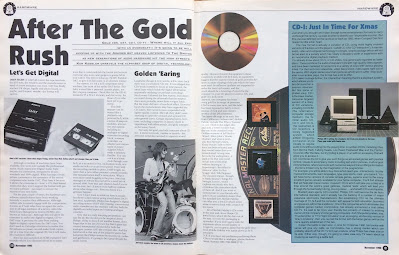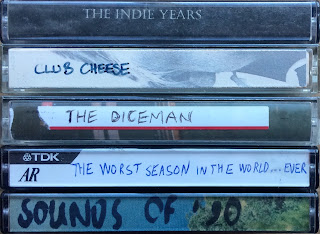How was the music of the 1990s experienced as home entertainment? On traditional stereo ‘systems’ via the analogue formats of vinyl and cassette, with the future looming in the shape of compact discs, and the brave new world of Digital Audio Tape about to revolutionise the music industry…
On the Move
Anyone storing their entire music collection on a phone or iPod should spare a thought for the 90s mobile listening experience. Developed over the previous decade, surprisingly bulky Minidisc and Walkman players allowed you to enjoy your favourite discs and tapes (one at a time) if you were on the move – until the batteries ran out…
Anyone storing their entire music collection on a phone or iPod should spare a thought for the 90s mobile listening experience. Developed over the previous decade, surprisingly bulky Minidisc and Walkman players allowed you to enjoy your favourite discs and tapes (one at a time) if you were on the move – until the batteries ran out…
Cassette Culture: Home Taping is Killing Music
The cassette remained thriving throughout the first half of the decade (in my experience at least), both in commercial form and for exchanging music via the ubiquitous mix-tape – there was even a market for the cassette single…
The cassette remained thriving throughout the first half of the decade (in my experience at least), both in commercial form and for exchanging music via the ubiquitous mix-tape – there was even a market for the cassette single…
Among the more notable discoveries was the ‘outer space’ design of Memorex’s Sound Invasion tape – this particular example found at Music Zone, Salford Shopping City in 1993/94…
A number of ‘lo-fi’ musicians
made an art form of the humble cassette, while magazines were still
happily advertising blank tapes for sale, compatible with glossy home
stereo and portable players…

In the Future
Meanwhile, German researchers had been working since 1987 on developing digital audio files, a project which eventually resulted in the MP3. It was patented in the US in 1996 and, rather than a cutting-edge electronic label, the independent Seattle-based Sub Pop (the first home of Nirvana and ‘grunge’) is credited as the first to release music in the MP3 format. The file-sharing network Napster was launched in 1999, and the transformation of the record industry was underway. Music in the twenty-first century was to be consumed in different ways than any previous listening experience…













No comments:
Post a Comment